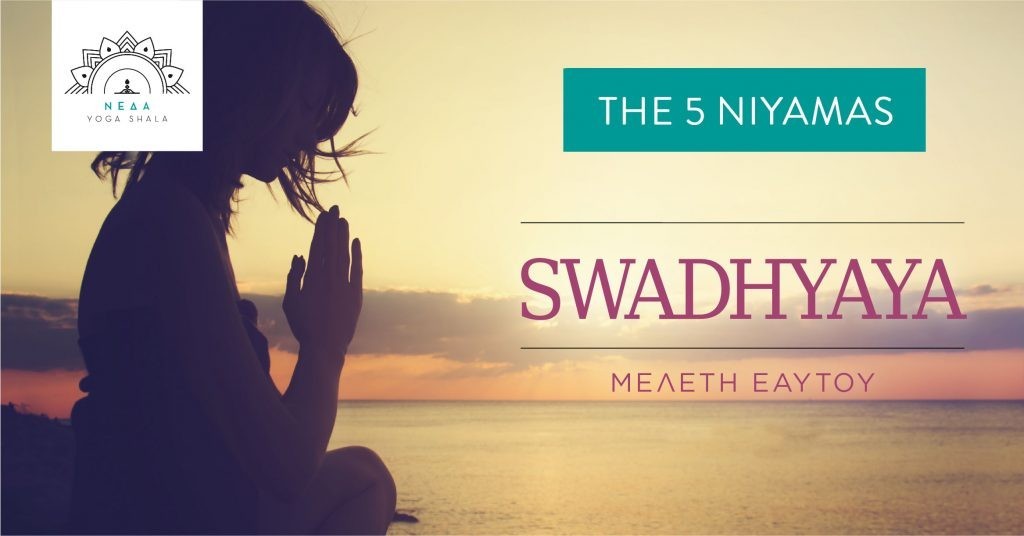
Swadhyaya
Many Αncient Indian philosophical text analysts describe Swadhyaya, the 4th of the 5 Niyamas by Patanjali, using the analogy of the sea: In this vast ocean, we humans are the waves. We think ourselves as being independent, autonomous beings. And while we are on the surface of the sea, we keep changing places, shapes, forms, dispositions... Based on those, we shape a self, we give it a name and characteristic traits, and we use it for our self-determination, doing everything we can to support and preserve it. But, we do not realise that this changing self with which we identify so intensely is nothing but the foam of the ocean and that our true nature is something deeper, calmer, richer, more stable and more true.
It is the sea itself!
This realization is Swadhyaya!
Swa means “self” and “dhyaya” is thinking, contemplating, studying and observing. So, the word Swadhyaya is translated as “study of the self”, which results to an understanding of our true nature.
Swadhyaya is also referred to as being the process of studying, of correct understanding and absorption of spiritual or philosophical texts, which inspire and guide us towards the exploration of ourselves and self-knowledge.
This process of self-examination, this “Who am I?” concerned various philosophers, researchers, poets etc. over the years. It was the “know thyself” to which Socrates and other Ancient Greek philosophers referred to. “Anyone can enter this spiritual world, as long as they know how to look inside”. And these references always revolve around the same notions, regardless of space and time: the One, the Infinity, the Ignorance, the Soul, etc.
And how can we approach Knowledge?
The most important tool is the observation of the self, on a physical, mental and emotional level, which turns into an object of research and study. We know so must about the outside world, but we rarely pay attention to the inside. How we breath at each moment, how we react to stimuli, how many emotions we experience throughout the day, how we make decisions, what our truths are, our fears and our conditionings, how we feel in the middle of chaos, or silence, who we really are in the end... Many spiritual seekers say that in order to discover what we are, we must first see what we are not. “I am not the body, I am not my senses, I am not my mind” as Ramana Maharishi used to say. So, in discovering our deeper Self, the first and foremost step is to understand (and deconstruct) our material (more accessible) nature.
Another tool towards self-knowledge is mantra chanting. In fact, many analysts, such as the great sage Vyasa, translate Swadhyaya as “mantra recitation”, since it is a sound that is recited in the mind, but brings us inner peace. The Self is often compared to a sunny sky. Loud bird flocks are the thoughts of the mind, which hide the sky. As soon as they settle down, the quiet, clear blue sky is revealed behind them, and the mantras constitute one of the most beautiful and powerful tools for mental calmness.
Finally, studying philosophical texts and being in touch with spiritual teachers is another way to come closer to knowledge. We often have a fixed impression of who we are and how the world turns, which becomes so familiar that we don’t even see or question it. We think that we “know”. But, sincere acceptance of ignorance can become the beginning of true knowledge. Socrates used to say that in order for someone to perceive their real self and to know how the world exists, they must “stop thinking that they are certain of what they know, and stop thinking that they know how the world is…Read other men and women’s writings in order to improve yourself… so that you easily gain what others have strived for”. External stimuli help us question our often limiting and inaccurate ideas. To listen to and contemplate on a different way of thinking. To be concerned and inspired. To discern a path. To ask questions about nature, our place in the world and in life.
Swadhyaya is a continuing practice, and it asks that we turn inside with unvarying sincerity, patience and courage. To embrace, instead of ignore, whatever does not suit us, to be strong, conscious and eternal seekers of the Self.